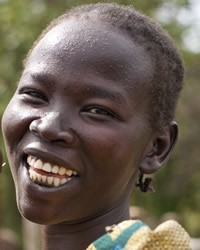Moru, Kala Moru in South Sudan

Photo Source:
Jason Wallis
|
Send Joshua Project a map of this people group.
|
| People Name: | Moru, Kala Moru |
| Country: | South Sudan |
| 10/40 Window: | No |
| Population: | 228,000 |
| World Population: | 230,800 |
| Primary Language: | Moru |
| Primary Religion: | Christianity |
| Christian Adherents: | 70.00 % |
| Evangelicals: | 8.00 % |
| Scripture: | Complete Bible |
| Ministry Resources: | Yes |
| Jesus Film: | Yes |
| Audio Recordings: | Yes |
| People Cluster: | Sudanic |
| Affinity Bloc: | Sub-Saharan Peoples |
| Progress Level: |
|
Introduction / History
The Moru people speak Moru, a Central Sudanic language with several dialects including Miza, Ägyi, Moroändri, Kediro, and 'Bari'ba. Historically, they have lived in Western Equatoria, particularly in the counties of Mundri East and West. Their history includes displacement due to Azande attacks, slave raids, and colonial administration under the Ottoman-Egyptian province of Equatoria, later part of the Lado Enclave under Belgian Congo rule.Christian missionary Dr. Kenneth Grant Fraser played a pivotal role in the early 20th century, establishing hospitals, schools, and churches in Moru territory. His work led to significant improvements in healthcare and education and helped reform harmful traditional practices.
What Are Their Lives Like?
The Moru are primarily subsistence farmers, cultivating crops such as sorghum, sesame, millet, cowpeas, cassava, maize, and groundnuts. They also engage in hunting, fishing, and gathering wild foods. Livestock, especially goats, sheep, and poultry, are common, with cattle numbers increasing in recent decades.Social life is rich with music, dance, and seasonal festivals. Drumming and dancing are tied to agricultural cycles, with dances like Ruma, Dego, and Yelu, marking different seasons. They use instruments such as the gara rattle, Kudi, and Lekyembe harps in both religious and social contexts.
What Are Their Beliefs?
About three-fourths identify as Christian, but traditional religious practices are sometimes blended with Christianity.
What Are Their Needs?
Despite historical improvements, modern healthcare infrastructure remains limited. Continued support for schools and literacy programs is essential, especially in rural areas. Most Moru rely on subsistence farming and lack access to markets, agricultural training, and financial services. South Sudan's ongoing conflicts have disrupted life, causing displacement and trauma among the Moru and neighboring groups.
Prayer Points
Pray for spiritual revival among the Moru, that nominal Christianity would be replaced by vibrant, Christ-centered faith.Ask God to raise up local leaders and evangelists who can disciple others who will disciple others in unreached areas.Intercede for healing and restoration for those affected by war, displacement, and trauma.Lift up the youth, that they would find hope and purpose in Christ amid economic and social challenges.Pray for protection and provision for families living in remote areas with limited access to food, water, and medical care.